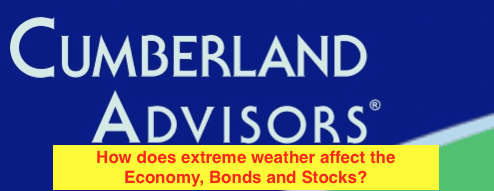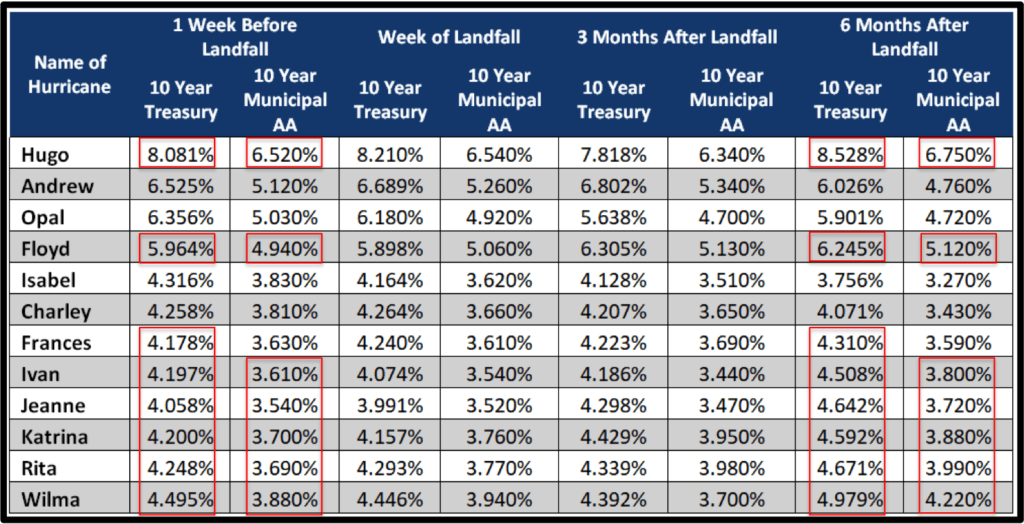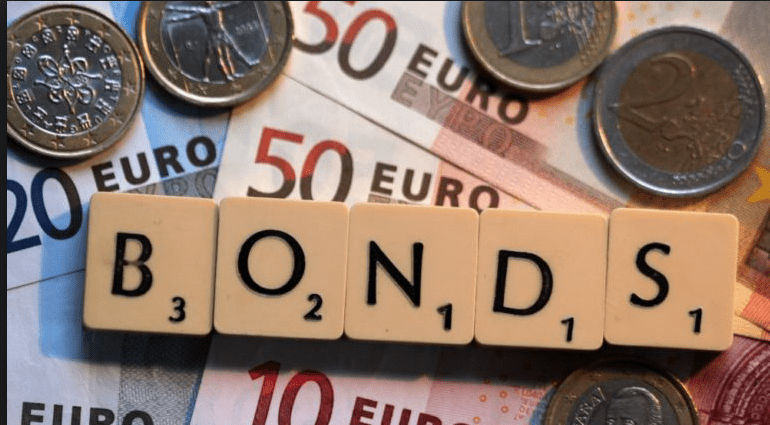
Commentary and analysis of hurricanes Harvey and Irma have dominated the financial airwaves lately. The pundits and pontificates projected their opinions of storm impacts on many markets. As we do with our weather forecasts, it is sometimes prudent to examine prior events for information that helps to predict the future. We have done this numerous times with respect to the energy and soft commodity markets. Gasoline, cotton and orange juice, to name only a few, have had incredible moves up and down. There have been several research pieces and news articles that took a crack at trying to predict the equity and even bond and gold price reactions based on historical hurricane “market analogs.”
MarketWatch had a nice article (written by Simon Maierhofer of iSPYETF) on costly hurricanes and the S&P 500. They found that most storms did not occur during inflection points, leading to price reversals. Those that did were likely for other reasons (i.e. Ike 2008–>financial crisis, Allison 2000–> Tech bubble). Although we mentioned how certain stocks and sectors may react, it seems, overall, as if the market trend remains uninterrupted.
Hurricanes, Irma and the Bond Market/Insurance Market
One of the biggest hurricane related moves ever observed in the bond market was after Andrew in 1992. Insurance companies were forced to raise cash in order to cover the damage to, and destruction of, coastal real estate in Florida. As a result, short term bond yields soared. The situation with Andrew was far worse than it is with Irma. Irma weakened when it hit Cuba and never fully regained its entire strength. After Andrew, insurance company stocks such as State Farm, Nationwide, etc. saw a hit of about 4-10% in their prices. However, this sell-off was short lived as many of these larger insurers benefited from raising premiums and also “gobbling up” the smaller insurers that went out of business.
A recent great article was written by John R. Mousseau, CFA & Gabriel Hament of Cumberland Advisors. They took an in-depth look at 12 of the most destructive hurricanes going back to 1989. Here is a crucial table excerpted from their research. (We added red boxes to highlight yield increases.)
SOURCE: BLOOMBERG, CUMBERLAND ADVISORS
“We observe RISING yields, particularly in the Treasury area, after eight out of twelve storms and the last six storms in a row. We think that points to overall better insurance coverage as well as quicker response by Federal agencies with relief dollars. This response translates, of course, into a higher level of economic activity in the years after a storm, and the bond markets perceive a potentially higher level of inflation.“–Cumberland Advisors
I suggest anyone interested in learning about the bond market to contact Cumberland Advisors. I have known them for years; and I feel they are some of the smartest and most ethical people in the investment industry. It is one of the finest companies in the field. Please visit their web site at www.cumber.com.
Another investment affected: Catastrophic Bonds
With interest rates very low for years now, more investors are seeking yields but ditching U.S. Treasury bonds. While yields have come up a bit, it is possible that recent hurricane activity (and maybe more to come) might cause the Federal Reserve to delay unwinding their balance sheet. This could mean more sudden interest rate rises are put on hold, as the U.S. has seen no less than $150 billion of damage from Irma and Harvey.
Consequently, an investor could offset low bond yields by purchasing assets that are “uncorrelated” such as commodities. However, some wealthier, and more conservative, individuals have been investing in catastrophe bonds. These CAT BONDS are essentially slices of reinsurance risk assets. These unique instruments can provide decent yields during a low yield environment. For more information about CAT BONDS, please go here:
http://www.investopedia.com/terms/c/catastrophebond.asp
In addition, there are still plenty of investment opportunities in municipal bonds, and as I mentioned above, CUMBERLAND ADVISORS has outstanding capabilities to handle your investment needs in this regard. As the fall winds blow and hurricanes continue to pop up, they can help you “weather any financial storm” that may or may not occur, and navigate your portfolio with conservative, well thought out investment strategies. -Jim Roemer
For more information contact them at:
-
Cumberland Advisors
- One Sarasota Tower, 2 N. Tamiami Trail, Suite 303, Sarasota, FL 34236
- P.O. Box 1419, Sarasota, FL 34230
- 614 Landis Ave, Vineland, NJ 08360
- Phone: 800-257-7013
- Fax: 941-554-4352














